IMS Culture _ The Mediterranean Culture
페이지정보
내용
The Mediterranean Culture
M.H. Mozafari(Institute for Mediterranean Studies, HK Professor)
The Mediterranean is a sea between southern Europe and northern Africa. The Mediterranean region is a crossroad of three continents; including Southern Europe, Western Asia and North Africa. Surrounded by several European, Asian and African countries the Mediterranean Sea is almost a landlocked and closed sea. A narrow strait (14 km wide) in the west links the Mediterranean Sea to the Atlantic Ocean. The artificial and manmade Suez Canal (163 km) in the eastern part connects it to the Red Sea (wikipedia). Today the coastal area of the Mediterranean Sea divided between 24 countries. Spain, France, Monaco, Italy, Slovenia, Croatia, Bosnia-Herzegovina, Montenegro, Albania, Greece, Turkey, Syria, Lebanon, Israel, Palestine, Egypt, Libya, Tunisia, Algeria, Morocco, Cyprus, Northern Cyprus, Malta, all have coastlines on the Mediterranean Sea.
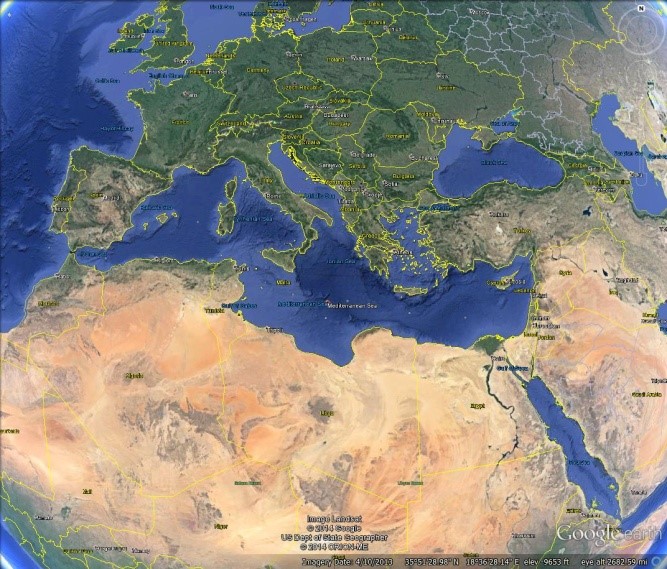
The identity means specific features and particularity of things. The Sea, the nature, geography, and diversity of climate, diversity of the fauna, flora and species, diversity of races, ethnicities, languages, traditions, cultures, history and civilizations are the main elements and characteristics of the Mediterranean identity . This combination and cultural diversity make the Mediterranean a unique region and recognizable from other areas such as the subcontinent, east and Southeast Asia, Latin America and rest of the world. In the midst of all this diversity, how can one talk about a common Mediterranean culture?!
However, here to have a better understanding of the Mediterranean common Culture, we should clarify the concepts of the Universality, Regionality and Particularity. Various natural, cultural, economic, political, historical issues sometimes are universal, regional or just relate to a particular country or place. For instance Greek is a particular language while Arabic is regional and English is a global and universal language. When we say Arabic is a regional language it means Arabic is not particular language of a nation.
Accordingly, most of the languages like Greek, Turk, Italian, etc. are particular culture in the Mediterranean area. They are part of the Mediterranean cultural identity, but not Common Mediterranean Culture. This is a method that the UNESCO follows in registering the cultural heritage of the nations (the United Nations Educational, Scientific and Cul, 2014). The "Mediterranean diet", is a special diet that is common in the seven countries of the Mediterranean Area. If this diet was practiced only in a specific country and a nation, it would have been recorded as a particular culture not the Mediterranean. Here we are following the same method and try to introduce some of the major cultural manifestations that are common among several Mediterranean Nations such as religions, philosophy, history and civilizations. These great cultural waves such as Christianity, Islam and modern philosophy laid a broad and deep impact in the entire Mediterranean region, although they may were lasting only in some part of it. These major subjects comprise many common cultural branches in terms of beliefs, values, customs, practices, symbols and appearances. In this part, the paper directly uses a reputable encyclopedia of “Britannica". For more information, readers can refer to this online encyclopedia.
1. The Mediterranean Religions
Although the Mediterranean is the origin of three monotheistic religions: the Judaism, Christianity and Islam; but only Christianity and Islam are two great regional and universal religions.
1) Christianity: Jesus Christ: Christ as Ruler, mosaic [Credit: De Antonis] major religion, stemming from the life, teachings, and death of Jesus of Nazareth (the Christ, or the Anointed One of God) in the 1st century ad. It has become the largest of the world’s religions. Geographically the most widely diffused of all faiths; it has a constituency of more than 2 billion believers. Its largest groups are the Roman Catholic Church, the Eastern Orthodox churches, and the Protestant churches; in addition to these churches there are several independent churches of Eastern Christianity as well as numerous sects throughout the world. See also Eastern Orthodoxy; Roman Catholicism; and Protestantism (Britannica, p. Christianity ).

<Church of the Holy Sepulchre, Palestine, Believed that is the crucifixion and resurrection site of Jesus Christ>
2) Islam, major world religion promulgated by the Prophet Muhammad in Arabia in the 7th century ce. The Arabic term islām, literally “surrender,” illuminates the fundamental religious idea of Islam—that the believer (called a Muslim, from the active particle of islām) accepts surrender to the will of Allah (in Arabic, Allāh: God). Allah is viewed as the sole God—creator, sustainer, and restorer of the world. The will of Allah, to which human beings must submit, is made known through the sacred scriptures, the Qurʾān (often spelled Koran in English), which Allah revealed to his messenger, Muhammad. In Islam Muhammad is considered the last of a series of prophets (including Adam, Noah, Abraham, Moses, Solomon, and Jesus), and his message simultaneously consummates and completes the “revelations” attributed to earlier prophets.
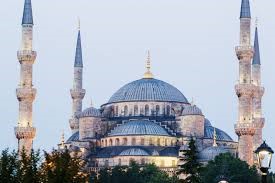
<The Blue Mosque, Istanbul, Turkey>
Retaining its emphasis on an uncompromising monotheism and a strict adherence to certain essential religious practices, the religion taught by Muhammad to a small group of followers spread rapidly through the Middle East to Africa, Europe, the Indian subcontinent, the Malay Peninsula, and China. By the early 21st century there were more than 1.5 billion Muslims worldwide. Although many sectarian movements have arisen within Islam, all Muslims (Britannica, p. Islam)
2. Philosophy:
Philosophy, (from Greek, by way of Latin, philosophia, “love of wisdom”) the critical examination of the grounds for fundamental beliefs and an analysis of the basic concepts employed in the expression of such beliefs. Philosophical inquiry is a central element in the intellectual history of many historical civilizations (Britannica).
1) Greek Philosophy: The ancient Greek philosophy is the origin of western philosophy. Some of the enormous Greek philosophers are like Plato and Aristotle still have great impact on eastern and western philosophy. Plato, (born 428/427 bce, Athens, Greece—died 348/347, Athens), ancient Greek philosopher, student of Socrates (c. 470–399 bce), teacher of Aristotle (384–322 bce), and founder of the Academy, best known as the author of philosophical works of unparalleled influence (Britannica). Aristotle, Greek Aristoteles (born 384 bce, Stagira, Chalcidice, Greece—died 322, Chalcis, Euboea), ancient Greek philosopher and scientist, one of the greatest intellectual figures of Western history. He was the author of a philosophical and scientific system that became the framework and vehicle for both Christian Scholasticism and medieval Islamic philosophy. Even after the intellectual revolutions of the Renaissance, the Reformation, and the Enlightenment, Aristotelian concepts remained embedded in Western thinking (Britannica).
2) Islamic Philosophy: The background of philosophic interest in Islam is found in the earlier phases of theology. But its origin is found in the translation of Greek philosophic works. By the middle of the 9th century, there were enough translations of scientific and philosophic works from Greek, Pahlavi, and Sanskrit to show those who read them with care that scientific and philosophic inquiry was something more than a series of disputations based on what the theologians had called sound reason. Moreover, it became evident that there existed a tradition of observation, calculation, and theoretical reflection that had been pursued systematically, refined, and modified for over a millennium (Britannica).
3) Nationalism: Nationalism, ideology based on the premise that the individual’s loyalty and devotion to the nation-state surpass other individual or group interests. Nationalism is a modern movement. Throughout history people have been attached to their native soil, to the traditions of their parents, and to established territorial authorities; but it was not until the end of the 18th century that nationalism began to be a generally recognized sentiment molding public and private life and one of the great, if not the greatest, single determining factors of modern history. Because of its dynamic vitality and its all-pervading character, nationalism is often thought to be very old; sometimes it is mistakenly regarded as a permanent factor in political behaviour. Actually, the American and French revolutions may be regarded as its first powerful manifestations. After penetrating the new countries of Latin America it spread in the early 19th century to central Europe and from there, toward the middle of the century, to eastern and southeastern Europe. At the beginning of the 20th century nationalism flowered in the ancient lands of Asia and Africa. Thus the 19th century has been called the age of nationalism in Europe, while the 20th century has witnessed the rise and struggle of powerful national movements throughout Asia and Africa (Britannica). Almost all countries in the region have been affected by this philosophy. Anti-colonial and independence movements such as Pan-Arabism, Pan-Turkism etc. have strong connection with nationalism.
4) Socialism: Socialism is an economic system and political philosophy. Socialism, social and economic doctrine that calls for public rather than private ownership or control of property and natural resources. According to the socialist view, individuals do not live or work in isolation but live in cooperation with one another. Furthermore, everything that people produce is in some sense a social product, and everyone who contributes to the production of a good is entitled to a share in it. Society as a whole, therefore, should own or at least control property for the benefit of all its members (Britannica). This Modern school of philosophy also had strong impact on all countries in the region. Part of the Mediterranean region and countries such as Slovenia, Serbia, Croatia, Bosnia and Herzegovina, Montenegro, Albania, has actually experienced such a philosophy for decades; some others had a Socialist party or governments for certain period.
5) Liberal Democracy: Liberal democracy is a form of government in which representative democracy operates under the principles of liberalism, i.e. protecting the rights of the individual, which are generally enshrined in law. It is characterised by fair, free, and competitive elections between multiple distinct political parties, a separation of powers into different branches of government, the rule of law in everyday life as part of an open society, and the equal protection of human rights, civil rights, civil liberties, and political freedoms for all persons. To define the system in practice, liberal democracies often draw upon a constitution, either formally written or uncodified, to delineate the powers of government and enshrine the social contract. After a period of sustained expansion throughout the 20th century, liberal democracy became the predominant political system in the world. A liberal democracy may take various constitutional forms: it may be a constitutional republic, such as France, Italy, or a constitutional monarchy, such as Spain. It may have a semi-presidential system (France), or a parliamentary system like Italy (wikipedia, p. Liberal democracy). However, in general, all the countries of the Mediterranean region have some kind of representative system of election. Liberal democracy is a common regional and even global culture.
3. Mediterranean Languages
Language, a system of conventional spoken, manual, or written symbols by means of which human beings, as members of a social group and participants in its culture, express themselves. The functions of language include communication, the expression of identity, play, imaginative expression, and emotional release (Britannica). Many languages are common in the Mediterranean region at the local and national level. According to our definition of regional and particular cultures; only Arabic and French are common in several or in many countries and are regional languages.
4. History
Every particular social group, tribe and nation in the Mediterranean region has its own historical information about its culture, land and region, economy, law, literature, art, philosophy, religion. Here the paper tries to just name those important Mediterranean civilizations and Empires that had an active role and influential at the regional level.
1) The Phoenician Civilization: They were merchants, traders, and colonizers who probably arrived from the Persian Gulf c. 3000 bc. By the 2nd millennium bc they had colonies in the Levant, North Africa, Anatolia, and Cyprus. They traded wood, cloth, dyes, embroideries, wine, and decorative objects; ivory and wood carving became their specialties, and the work of Phoenician goldsmiths and metalsmiths was well known. Their alphabet became the basis of the Greek alphabet (Britannica).
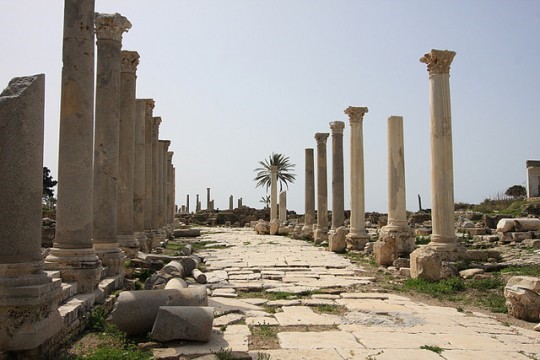
<The Phoenician port, Sour (Tyre) Lebanon>
2) The Mesopotamia Civilization: is the region in southwestern Asia where the world’s earliest civilization developed. The name comes from a Greek word meaning “between rivers,” referring to the land between the Tigris and Euphrates rivers, but the region can be broadly defined to include the area that is now eastern Syria, southeastern Turkey, and most of Iraq. The region was the centre of a culture whose influence extended throughout the Middle East and as far as the Indus valley, Egypt, and the Mediterranean (Britannica).
3) The Egyptian Civilization: Ancient Egypt, civilization in northeastern Africa that dates from the 4th millennium bc. Its many achievements, preserved in its art and monuments, hold a fascination that continues to grow as archaeological finds expose its secrets. Egypt’s heartland, the Nile River valley and delta, was the home of one of the principal civilizations of the ancient Middle East and, like Mesopotamia farther east, was the site of one of the world’s earliest urban and literate societies. Pharaonic Egypt thrived for some 3,000 years through a series of native dynasties that were interspersed with brief periods of foreign rule. After Alexander the Great conquered the region in 323 bc, urban Egypt became an integral part of the Hellenistic world (Britannica).

<The Great Sphinx at Giza, Egypt>
4) The Persian Empire: Persia, historic region of southwestern Asia associated with the area that is now modern Iran. Achaemenian Dynasty, also called Achaemenid (559–330 bc), ancient Iranian dynasty whose kings founded and ruled the Achaemenian Empire. The dynasty became extinct with the death of Darius III, following his defeat (330 bc) by Alexander the Great. During the time of Darius I and Xerxes I, the empire extended as far west as Macedonia and Libya and as far east as the Hyphasis (Beās) River; it stretched to the Caucasus Mountains and the Aral Sea in the north and to the Persian Gulf and the Arabian Desert in the south (Britannica).
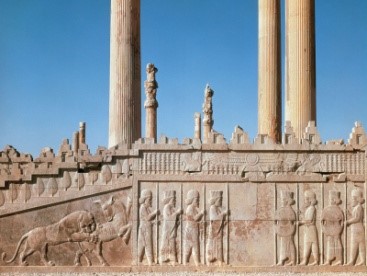
<The Persepolis, Shiraz, Iran>
5) The Greek Empire: Ancient Greek civilization, the period following Mycenaean civilization, which ended in about 1200 bce, to the death of Alexander the Great, in 323 bce. It was a period of political, philosophical, artistic, and scientific achievements that formed a legacy with unparalleled influence on Western civilization. He overthrew the Persian empire, carried Macedonian arms to India, and laid the foundations for the Hellenistic world of territorial kingdoms (Britannica).
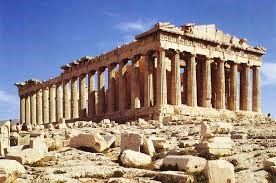
<The Acropolis (Akropolis), Greece>
6) The Roman Empire: Rome must be considered one of the most successful imperial powers in history. In the course of centuries Rome grew from a small town on the Tiber River in central Italy into a vast empire that ultimately embraced England, all of continental Europe west of the Rhine and south of the Danube, most of Asia west of the Euphrates, northern Africa, and the islands of the Mediterranean. Unlike the Greeks, who excelled in intellectual and artistic endeavours, the Romans achieved greatness in their military, political, and social institutions. Roman society, during the republic, was governed by a strong military ethos (Britannica).
7) The Arab Muslims Empire: Caliphate, the political-religious state comprising the Muslim community and the lands and peoples under its dominion in the centuries following the death (632 ce) of the Prophet Muhammad. Ruled by a caliph (Arabic khalīfah, “successor”), who held temporal and sometimes a degree of spiritual authority, the empire of the Caliphate grew rapidly through conquest during its first two centuries to include most of Southwest Asia, North Africa, and Spain. Dynastic struggles later brought about the Caliphate’s decline, and it ceased to exist with the Mongol destruction of Baghdad in 1258 (Britannica).
8) The Ottoman Empire: the Ottoman sultans, who had occasionally styled themselves as caliphs since the 14th century, began to stress their claim to leadership of the Islamic community. This served both as means of retaining some degree of influence over Muslim populations in formerly Ottoman lands and as means of bolstering Ottoman legitimacy within the empire. The caliphate was abolished in 1924, following the dissolution of the Ottoman Empire and the rise of the Turkish Republic (Britannica).
5. The Mediterranean diet:
Mediterranean diet considered to be an intangible cultural heritage of the region and humanity. Practices, representations, expressions, knowledge, skills, etc. are part of the human ‘intangible cultural heritage’. The processes of globalization and social transformation are threat of deterioration, disappearance and destruction of the intangible cultural heritage. To safeguard the cultural heritage and the cultural diversity UNESCO has designed certain policies including registration system and creating greater universal awareness, especially among the younger generations. To record a particular culture as an ‘intangible Cultural Heritage’ the submitting State is requested to demonstrate that an element proposed for inscription on the Representative List of the Intangible Cultural Heritage of Humanity satisfies all of the criteria defined in Article 2 of the Convention for the Safeguarding of the Intangible Cultural Heritage (UNESCO, 2003).
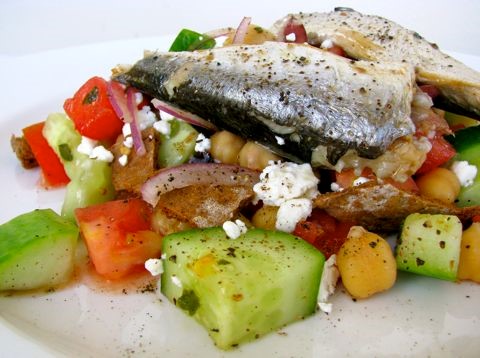
Based on facts and information provided by Greece, Spain, Italy, Morocco, Portugal, Cyprus and Croatia about the diet culture including knowledge, skill and customs; the UNESCO officially registered ‘the Mediterranean diet’ as a common intangible Cultural Heritage of these Mediterranean Countries. The Mediterranean diet involves a set of skills, knowledge, rituals, symbols and traditions concerning crops, harvesting, fishing, animal husbandry, conservation, processing, cooking, and particularly the sharing and consumption of food. Eating together is the foundation of the cultural identity and continuity of communities throughout the Mediterranean basin. It is a moment of social exchange and communication, an affirmation and renewal of family, group or community identity. The Mediterranean diet emphasizes values of hospitality, neighbourliness, intercultural dialogue and creativity, and a way of life guided by respect for diversity. It plays a vital role in cultural spaces, festivals and celebrations, bringing together people of all ages, conditions and social classes. It includes the craftsmanship and production of traditional receptacles for the transport, preservation and consumption of food, including ceramic plates and glasses. Women play an important role in transmitting knowledge of the Mediterranean diet: they safeguard its techniques, respect seasonal rhythms and festive events, and transmit the values of the element to new generations. Markets also play a key role as spaces for cultivating and transmitting the Mediterranean diet during the daily practice of exchange, agreement and mutual respect (the United Nations Educational, Scientific and Cul, 2014).




